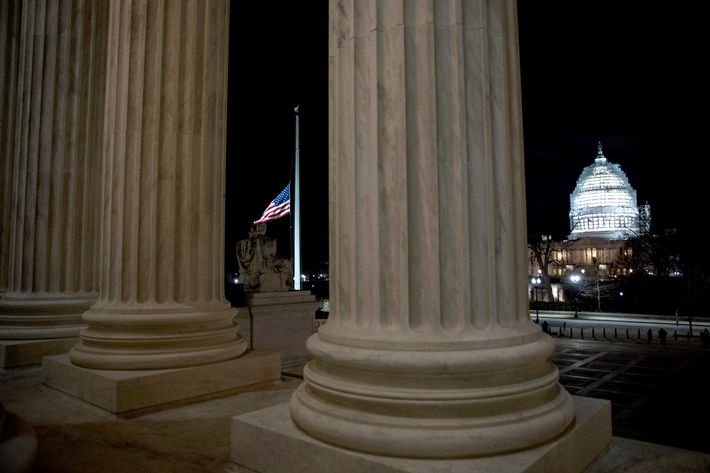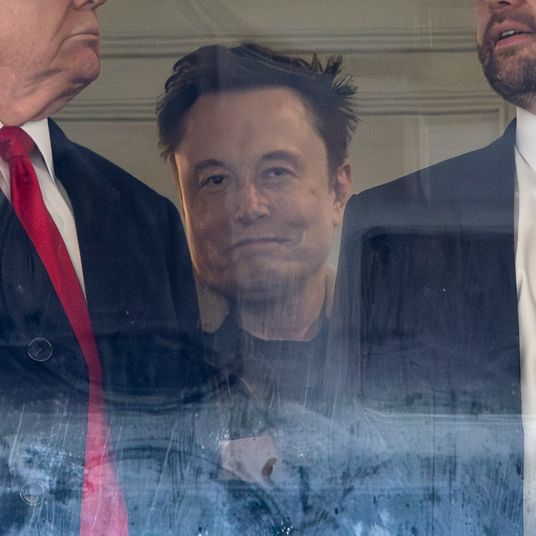
Following the death of Supreme Court Justice Antonin Scalia on Saturday, there was instant and near unanimous agreement from Republican politicians that no replacement should be nominated or confirmed until a new president is sworn in next year, a logic obviously pinned to the coin-toss chance that a Republican will win the White House this fall. Democrats, in turn, were quick to reject that stance as unprecedented and unconstitutional, and President Obama confirmed on Saturday night that he would indeed be nominating a replacement judge. Minutes later at the GOP debate, every Republican candidate made it clear they wanted any Obama nominee blocked, while Ted Cruz and Marco Rubio hastily postured to make Scalia’s seat a central issue for their campaigns. In addition, while the quick consensus behind rejecting any Obama nominee may seem like an easy punt for White House–hopeful Republicans, it’s also probably an essential one, lest they risk alienating the party’s powerful base. But whatever the GOP chooses to do next, the path ahead will be fraught with risks and ramifications.
On one hand, a vacant seat — let alone a conservative legend’s vacant seat — will definitely be used by both parties to crystallize the stakes of November’s elections and use base issues like abortion and gun control to drive core supporters to the polls (a dynamic which could heavily influence the primary races as well). The problem for Republicans is that this extra energy might naturally favor Democrats, as the New Yorker’s John Cassidy suggests:
It is well known, and accepted on both sides, that the Democrats’ hopes of holding on to the White House hinge on getting a high voter turnout on November 8th. If you were a Democratic strategist trying to maximize turnout, what would you most like to see? One possibility, surely, is the prospect of the election being transformed into a referendum on the President versus the do-nothing Republican Congress.
The Atlantic’s David Frum, a conservative, takes another angle on this point, noting that Republicans are provoking Obama and may not like the result. He points a finger at Senate Majority Leader Mitch McConnell, who quickly vowed on Saturday to bar any Supreme Court nominee put forth by the president:
By assuring Obama that he need not worry that a nominee will actually serve on the Court, McConnell empowered and invited the president to play radical politics with the nomination. The big concern Democrats have (or should have) about 2016 is the decline in turnout that occurred between 2008 and 2012. Obama’s support dropped by 3.6 million votes between his election and his re-election. The Republican ticket gained only 900,000 votes over the same four years. Absenteeism was most marked among younger voters and Latinos.
What saved Obama was the loyalty and commitment of African Americans: their participation actually increased between 2008 and 2012 — and it was their ballots that provided the president with his margin of victory. If they should feel uninspired in 2016, the Democratic nominee is likely doomed. Democrats will want to do everything they can to rev up African American excitement and energy.
Such as for example, nominating somebody like Eric Holder, who might welcome his nomination with a fiery statement about voting rights, affirmative action, and Black Lives Matter.
And then there is the down-ticket risk for the GOP, as the New York Times summarizes:
Republican officials privately acknowledged that refusing to bring Mr. Obama’s appointment to a vote could prove difficult to sustain, particularly with the Senate controlled by a handful of Republican incumbents from moderate and liberal-leaning states. It was notable that Senator Rob Portman of Ohio, who faces re-election this year, made no pledge about blocking Mr. Obama’s pick in his statement regarding Justice Scalia’s death.
No matter what, Time’s Jay Newton-Small points out that Mitch McConnell is now probably between a rock and a hard-right place:
The Republican Party is already splitting between the Establishment and anti-Establishment wings. If the Establishment were to cave on this nomination, the anti-Establishment wing would gain even more power, ahead of key primaries that will not only pick the next presidential nominee but nominees for state and federal races. In many cases, if extreme anti-Establishment candidates win those primaries, they won’t have a shot in the general election.
Already, McConnell has a tough battle ahead keeping his slim four-seat majority. Republicans in seven states that Obama won both in 2008 and 2012 are up for reelection: Florida, Illinois, Indiana, New Hampshire, Ohio, Pennsylvania and Wisconsin. Five of those races are currently toss-ups. So not only would presidential hopefuls like Cruz and Rubio be forced to vote on a potential court-changing nominee, but so would all eight of those vulnerable senators.

On the other hand, if Obama nominates a moderate judge and Republicans reject him or her, only to lose the presidential election and Senate this fall, they will have traded a slightly-liberal court for a very liberal one, as a new Democratic president with a Senate-majority would likely nominate a true liberal next year. Slate’s Mark Joseph Stern tries to think through the GOP’s logic:
[A]re Republicans so confident in the likelihood of one of these alternatives that they’re willing to risk the worst possible outcome? Are they so horrified by the modest liberal victories that would come with the confirmation of a moderate as to deploy a strategy that could bring the second coming of the Warren Court? And, just as critically, are they really certain that a presidential election entirely focused on the impact of the court on American life — as this one surely now will — plays to their advantage? Most Americans, after all, absolutely despise Citizens United and want to keep Roe v. Wade on the books. An election that focuses overwhelmingly on money in politics and first-trimester abortion is a losing election for Republicans.
Of course, the Republican strategy in the Obama era has been based on massive, unprecedented risks like this one, and the Senate stonewallers might just have the winning hand. But the odds that this particular gamble plays to their favor strike me as chillingly low.
Adds Stern, “Expect to hear a growing din of chatter along these lines as more Republicans survey the political landscape and realize that the obstructionist path forward may also be the riskiest.”
There’s also another potential problem if the now eight-justice Court splits evenly on current and future controversial cases, since split decisions will simply uphold lower-court rulings. In other words, the vacant seat leaves all lower-court rulings in place, a scenario which would give liberals a distinct advantage, argues Linda Hirshman in the Washington Post:
[Most of the country] is governed by appeals courts dominated by Democrats. The suit against Obama’s environmental initiative, which the Supreme Court just stayed, came from the liberal D.C. Circuit, which had unanimously refused to grant the stay. Now the Obama administration can simply have the Environmental Protection Agency come up with a slightly different new plan and run to the liberal D.C. courts to bless it and refuse to stay it. It’s unlikely the now-divided Supreme Court would come up with a majority to stay the new rules […]
That’s why the effect of an equally divided court has enormous potential to strengthen Obama’s hand in dealing with the Republican Senate in picking a replacement: Even if the GOP blocks his nominee, the policy outcomes would be very similar to what they’d be if the court had a liberal majority […]
Right now, McConnell sounds like he doesn’t recognize the peril his party is in. If Obama signals that he’s willing to take advantage of the situation by taking actions like passing new environmental rules or moving for rehearing in the pending cases, he’ll put pressure on the Senate by getting what he wants without his court pick. Two-thirds of the people in the country live in blue-court America.
Then again, even if the Republicans block Obama’s nomination, win the White House in November, keep the Senate, and nominate and confirm their own judge, they still might not get what they really want, as the American Conservative’s Daniel McCarthy warns:
No matter what happens, conservatives who hope that Supreme Court appointments will turn the tide of the culture war are apt to be disappointed. Since the brutal Robert Bork hearings, a generation of lawyers aspiring to land on the Supreme Court one day has learned to keep quiet about controversial subjects. That first of all makes identifying reliably right-wing nominees difficult, and it further means that having acquired a habit of avoiding conflict even a right-leaning nominee might not have much spirit for battle once on the court. Certainly it’s hard to imagine any new justice following Scalia’s example as an outspoken cultural combatant. Justice Alito is not quite another Scalia, and future justices promise to be more in the mold of John Roberts.
Stepping back, Vox’s Ezra Klein is concerned about nothing less than the entire American political system. Looking at the looming battle, he worries the country’s democracy is about to fail a massive test by proving that a divided government in present-day America is no longer capable of actually governing:
This isn’t to predict constitutional collapse over a Supreme Court vacancy […] But if American politics cannot fill a Supreme Court vacancy amidst divided government in any of the 25 percent of years that are presidential election years, then that is proof that our system is deteriorating in its capacity to govern amidst divided party control — that the space for effective governance is narrowing because of party polarization.
Divided government is a common occurrence in American politics. It didn’t used to signal disaster for the system’s ability to solve problems. If it does so now, then the country will, over time, pay a serious price for a political system that no longer fits its political parties.
Lastly, while this fight will almost certainly play out along hyperpartisan lines, Irin Carmon takes some time to consider the warm friendship shared between Justice Scalia and his ideological opposite on the Court, Justice Ruth Bader Ginsburg:
“If you can’t disagree ardently with your colleagues about some issues of law and yet personally still be friends, get another job, for Pete’s sake,” is how Scalia once described their lifetime appointments. “As annoyed as you might be about his zinging dissent, he’s so utterly charming, so amusing, so sometimes outrageous, you can’t help but say, ‘I’m glad that he’s my friend or he’s my colleague,’ ” Ginsburg said. Sometimes, she said, she had to pinch herself to not laugh in the courtroom when Scalia said something audacious […]
Ginsburg was [also] grateful for how Scalia disagreed: giving her a copy of his dissent as soon as possible, so she could properly respond. “He absolutely ruined my weekend, but my opinion is ever so much better because of his stinging dissent,” she said. Whether or not it was how Scalia saw it, for Ginsburg their public friendship also made a statement about the court as an institution: that it was strengthened by respectful debate, that it could work no matter how polarized its members were.
Ironically, Scalia’s death has laid bare just how endangered such comity now is in Washington.






























